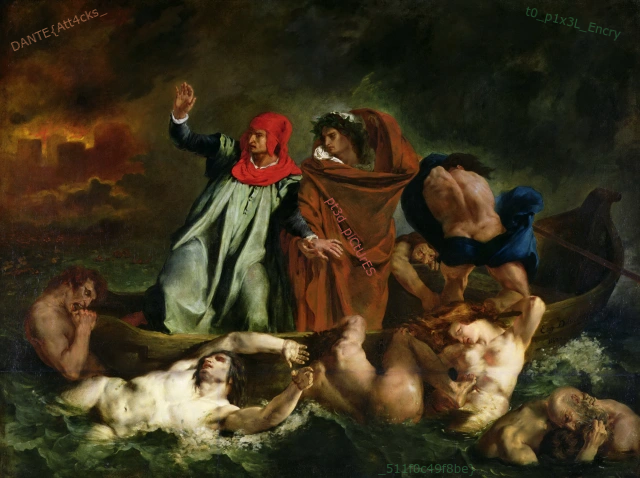Piedpic [DanteCTF 2023]
Description
Dante took many pictures of his journey to the afterlife. They contain many revelations. I’ll give you one of these pictures if you’ll give me one of yours!
Key observations
Looking at the code we notice 2 things:
- pixels are xored with 255 (aka bitwise reversed) for each odd bit among the 3 least significant bits of the key at that index
- pixels are scrambled based on $k_i$ (mod 6)
Knowing this, we conclude that the relevant part of the key is a tuple $(kl_i, km_i)$, where $kl_i$ holds the 3-lsb of $k_i$ and $km_i$ holds $k_i % 6$.
Solution
To find $(kl_i, km_i)$, we can send an image where every pixel is $(2^0, 2^1, 2^2)$, because this way we can uniquely identify each channel of the pixel after the transformation and this way also reverse the transformation and recover the key.
Source Code
We used this script to get the images from the oracle.
from pwn import *
from PIL import Image
from base64 import b64encode, b64decode
from io import BytesIO
import numpy as np
from time import sleep
io = remote('challs.dantectf.it', 31511)
print(io.recvline())
print(io.recvline())
print(io.recvuntil(b'?'))
io.sendline(b'y')
print(io.recvline())
print(io.recvline())
enc_flag = io.recvline()
print(io.recvline())
print('encflag received')
enc_flag_bytes = b64decode(enc_flag.decode().strip())
enc_flag_img = Image.open(BytesIO(enc_flag_bytes))
enc_flag_img.save("enc_flag_img.png", "png")
my_img = enc_flag_img.copy()
pixels = list(my_img.getdata())
for i in range(len(pixels)):
pixels[i] = (1, 2, 4)
my_img.putdata(pixels)
print(io.recvuntil(b':'))
my_img_data = b64encode(my_img.tobytes())
io.sendline(my_img_data)
print(io.recvline())
print(io.recvline())
enc = io.recvline()
enc_img_bytes = b64decode(enc.strip())
enc_img = Image.open(BytesIO(enc_img_bytes))
enc_img.save("my_enc_img.png", "png")
print(io.recvline())
print(io.recvline())
print(io.recvline())
After retrieving both images, we used this script to decode the final image
from PIL import Image
from math import log2
perm_table = {
0: (0, 1, 2),
1: (0, 2, 1),
2: (1, 0, 2),
3: (1, 2, 0),
4: (2, 0, 1),
5: (2, 1, 0)}
perm_table_inv = { v: k for k, v in perm_table.items() }
perm_rev_table = {}
for k, v in perm_table.items():
print(k)
li = [0, 0, 0]
for i in range(3):
li[v[i]] = i
perm_rev_table[k] = tuple(li)
def get_key():
my_enc_img = Image.open("./my_enc_img.png")
key = []
pixels = list(my_enc_img.getdata())
for i, p in enumerate(pixels):
p = list(p)
k_lsb = []
for idx in range(3):
if p[idx] > 4:
k_lsb.append(1)
p[idx] ^= 255
else:
k_lsb.append(0)
p[idx] = int(log2(p[idx]))
# k_lsb = k_lsb[::-1] this doesn't work??
pixels[i] = p
tp = tuple(p[:3])
k_mod6 = perm_table_inv[tp]
r, g, b = perm_rev_table[k_mod6]
k_lsb = [k_lsb[r], k_lsb[g], k_lsb[b]]
# I've got no fking clue why you have to reverse
# this exactly here but it works lol
k_lsb = k_lsb[::-1]
k_lsb = int(''.join([str(x) for x in k_lsb]), 2)
key.append((k_lsb, k_mod6))
return key
def decrypt(key, path):
flag = Image.open(path)
pixels = list(flag.getdata())
for i in range(len(pixels)):
k_lsb, k_mod6 = key[i]
r, g, b = perm_rev_table[k_mod6]
colors = pixels[i]
colors = (colors[r], colors[g], colors[b])
pixels[i] = tuple([c ^ 255 if k_lsb & (1 << i)
else c for i, c in enumerate(colors)])
flag.putdata(pixels)
flag.save("./result.png")
flag.show()
key = get_key()
decrypt(key, "./enc_flag_img.png")
Result

Flag
DANTE{Att4cks_t0_p1x3L_Encrypt3d_piCtUrES_511f0c49f8be}